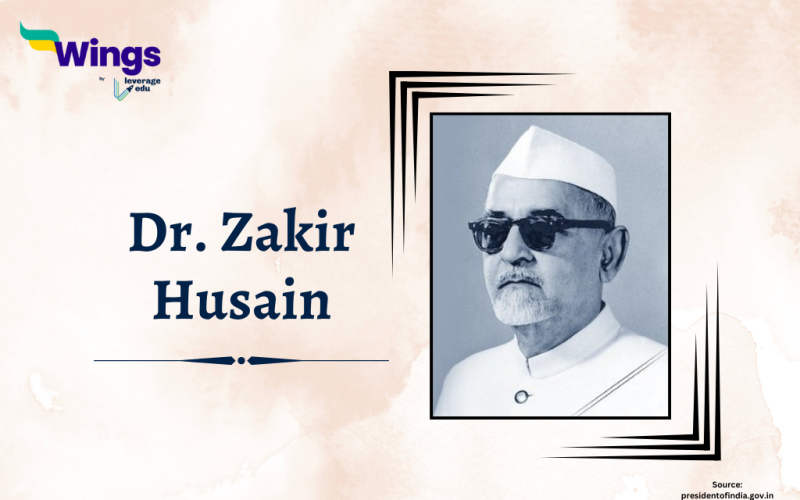Indian politician and educationist Dr. Zakir Husain Khan held the office of the third president of India from May 13, 1967, until his passing on May 3, 1969, also becoming the first President who died while serving the office. One of the important roles that he played in Indian society was as an educator. Read this blog to learn more about Dr. Zakir Husain Khan and his life.
Table of Contents [show]
| Overview Table Of Dr. Zakir Husain | |
| Born | Feb 8, 1897 |
| Death | May 3, 1969 |
| Occupation | Statesman, Educator, and economist |
| Notable Achievements | First Muslim President of India (1967-1969), Champion of Secularism, Vice-Chancellor of Aligarh Muslim University and Awarded Bharat Ratna (1963) |

Early Life Of Dr. Zakir Husain
A solid educational background and a growing interest in social activism characterized Dr. Zakir Husain’s early years.
- Zakir Husain was born in Hyderabad in 1897 to an Afridi Pashtun family.
- He received his initial schooling in Hyderabad, followed by high school at Islamia High School in Etawah.
- He has done his schooling in Quran, Persia, and Urdu.
- There is some disagreement regarding his primary school education, but Sultan Bazaar School in Hyderabad is said to be his primary school.
- Initially, Husain aimed for a medical career and enrolled in a Bachelor of Science program at the Christian Degree College in Lucknow.
- Dr. Zakir Husain joined the prestigious Muhammadan Anglo-Oriental College (later Aligarh Muslim University) in Aligarh.
- Husain was greatly affected by Mahatma Gandhi‘s advice to Indian youth to leave state-sponsored institutions. This motivated him to participate in establishing the National Muslim University, which subsequently developed into Jamia Millia Islamia, one of India’s premier universities.
Also read: Atmaram Pandurang: Life, Contributions and Achievements
Contributions Of President Dr. Zakir Husain
Some of his contributions are –
| Field | Contribution | Description |
| Education | Aligarh Muslim University (AMU) | Instrumental in retaining AMU as a national institution after partition. |
| Served as Vice-Chancellor, promoting modern education. | ||
| National Movement | Involved in founding Jamia Millia Islamia, a prominent Indian university. | |
| Education Leadership | Various Educational Bodies | Held positions in the Indian Universities Commission, the University Grants Commission (UGC), and the Central Board of Secondary Education (CBSE). |
| Politics & Governance | Rajya Sabha | Served as a nominated member, contributing to national discussions. |
| Governor of Bihar | Provided leadership and administration for the state. | |
| Vice President of India | Played a crucial role in the Indian government. | |
| International Relations | UNESCO | Served as a member, promoting cultural understanding. |
| Culture | Promoted national unity and interfaith dialogue. |
Also Read: Who is Raj Reddy?
Later Life Of Dr. Zakir Husain
| Category | Details |
| Political Career | Governor of Bihar (1950-1956) |
| Vice President of India (1956-1962) | |
| President of India (1962-1967) |
Awards Of Dr. Zakir Hussain
The honours presented to Dr Zakir Hussain are –
- Bharat Ratna (1963): India’s highest civilian award, recognizing his exceptional service.
- Padma Vibhushan (1954): Recognition for his contributions to education and culture.
FAQs
He served as India’s President, Vice President, Governor of Bihar, and Vice-Chancellor of Aligarh Muslim University.
He played a pivotal role in founding Jamia Millia Islamia and was a champion of modern education in India.
He was awarded the Bharat Ratna in 1963 and the Padma Vibhushan in 1954 for his contributions to education and governance.
Relevant Blogs
If you want to know more about other Famous Personalities then visit our General Knowledge page!
 One app for all your study abroad needs
One app for all your study abroad needs















 45,000+ students trusted us with their dreams. Take the first step today!
45,000+ students trusted us with their dreams. Take the first step today!
